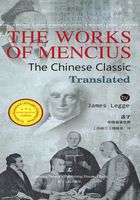
CHAPTER VI
1. Mencius said to Tâi Pû-shăng, 'I see that you are desiring your king to be virtuous, and will plainly tell you how he may be made so. Suppose that there is a great officer of Ch'û here, who wishes his son to learn the speech of Ch'î. Will he in that case employ a man of Ch'î as his tutor, or a man of Ch'û?' 'He will employ a man of Ch'î to teach him,' said Pû-shăng. Mencius went on, 'If but one man of Ch'î be teaching him,and there be a multitude of men of Ch'û continually shouting out about him, although his father beat him every day, wishing him to learn the speech of Ch'î, it will be impossible for him to do so. But in the same way, if he were to be taken and placed for several years in Chwang or Yo, though his father should beat him, wishing him to speak the language of Ch'û, it would be impossible for him to do so.
2. 'You supposed that Hsieh Chü-châu was a scholar of virtue, and you have got him placed in attendance on the king.


CHAPTER 6. THE INFLUENCE OF EXAMPLE AND ASSOCIATION. THE IMPORTANCE OF HAVING VIRTUOUS MEN ABOUT A SOVEREIGN'S PERSON.
1. Tâi Pû-shăng was a minister of Sung, the descendant of one of its dukes who had received the posthumous epithet of Tâi, which had been adopted as their surname by a branch of his posterity. 子欲……与,—与, 2nd tone, the interrogative implying an affirmative reply. 欲其子之齐语, 'wishes the Ch'îspeech of his son', i.e. wishes his son to learn Ch'î.诸,—interrogative, and equal to 之乎. 咻, read hsiû,=讙, 'shouting', 'clamorous'. Chwang and Yo were two well-known quarters in the capital of Ch'î, the former being the name of a street, and the latter the name of a neighbourhood; see the 四书拓余说; in loc.
2. Hsieh Chü-châu was also a minister of Sung,a descendant of one of the princes of Hsieh, whose family had adopted the name of their original State as their surname.


Suppose that all in attendance on the king, old and young, high and low, were Hsieh Chü-châus, whom would the king have to do evil with? And suppose that all in attendance on the king, old and young, high and low, are not Hsieh Chü-châus, whom will the king gave to do good with? What can one Hsieh Chü-châu do alone for the king of Sung?'